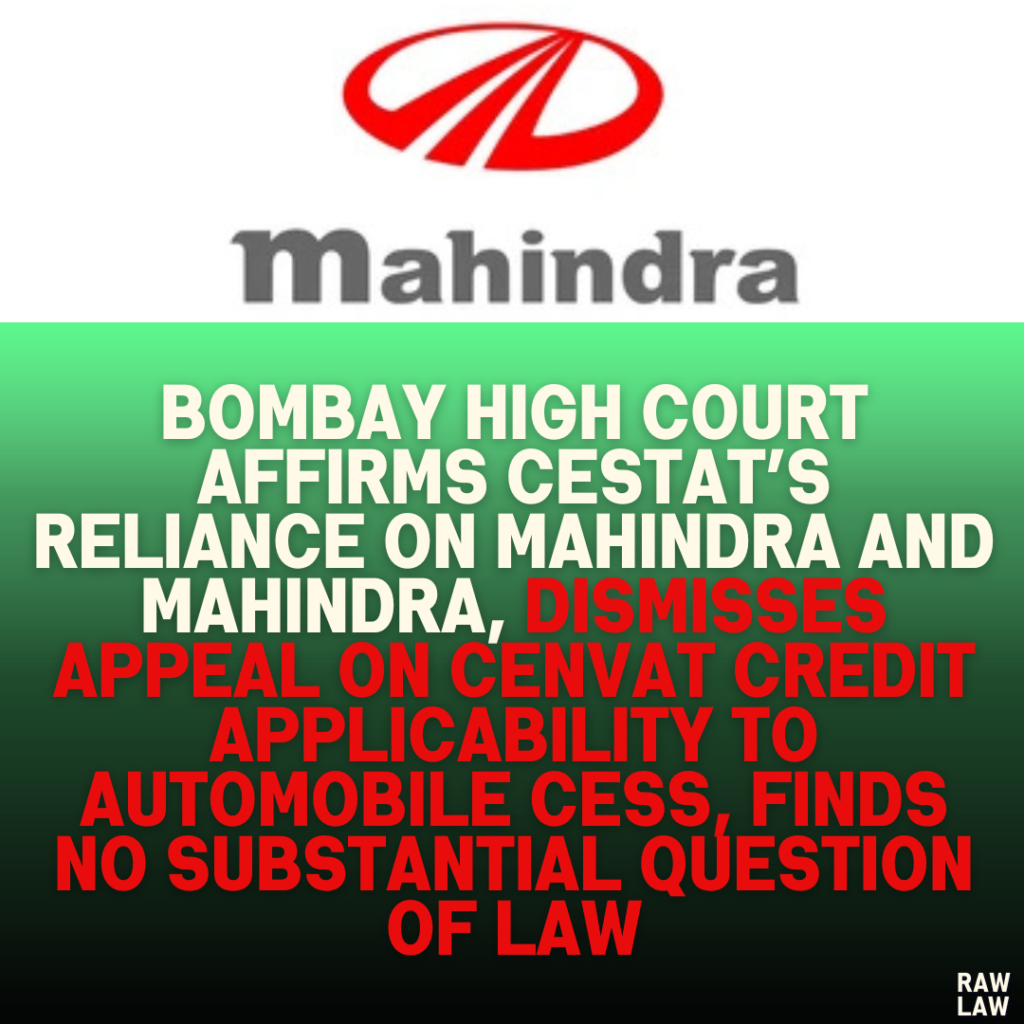Court’s Decision:
The Bombay High Court dismissed the appeal by the Commissioner of Central Excise, holding that the CESTAT’s reliance on the decision in Mahindra and Mahindra Ltd. v. Commissioner of Central Excise was appropriate. The court found no substantial question of law to be addressed, affirming that the CESTAT did not err in equating automobile cess with excise duty under Rule 6 and Rule 7 of the CENVAT Credit Rules.
Facts:
The appeal stemmed from a CESTAT order favoring Mahindra and Mahindra Ltd., which had disputed the exclusion of automobile cess from CENVAT credit. The CESTAT had relied on prior judgments to determine that automobile cess should be considered part of excise duties, allowing it to fall within the CENVAT framework.
Issues:
- Whether the CESTAT erred in relying on a judgment deemed per incuriam by the Supreme Court in Unicorn Industries v. Union of India.
- Whether the CESTAT incorrectly applied Rule 6 and Rule 7 of the CENVAT Credit Rules in relation to automobile cess as excise duty.
- Whether the Tribunal was right in disregarding the ruling in Hero Motocorp Ltd., which emphasized limitations in credit distribution for certain taxes.
Petitioner’s Arguments:
The Commissioner argued that the CESTAT misinterpreted Rule 6 and Rule 7 by equating automobile cess with excise duty, referencing Unicorn Industries to assert that the Mahindra case was incorrectly applied as it involved different facts and circumstances.
Respondent’s Arguments:
The respondent, Mahindra and Mahindra Ltd., maintained that the CESTAT’s decision was correct. They argued that Unicorn Industries was inapplicable since the cess in question had been duly paid, differentiating it from the Unicorn Industries scenario where no such payment obligation was present.
Analysis of the Law:
The court examined Rule 6 of the CENVAT Credit Rules, which bars credit for input used in the manufacture of exempt goods or services, and Rule 7, concerning the distribution of credit for units engaged in exempt goods or services. The court upheld the interpretation that automobile cess, akin to excise duty, could be factored into the credit distribution under these rules.
Precedent Analysis:
The court referred to its previous ruling in Mahindra and Mahindra Ltd., which classified additional cesses as excise duties under the CENVAT framework. The court clarified that although Unicorn Industries addressed different circumstances, it did not invalidate the principles in Mahindra and Mahindra relevant to this case.
Court’s Reasoning:
The court reasoned that since Mahindra and Mahindra had specifically addressed the categorization of cesses within the CENVAT rules, its findings were applicable here. The court found no grounds for the petitioner’s claim that the cess payments in this case should be excluded from CENVAT credit eligibility, nor did it identify any substantial question warranting further examination.
Conclusion:
The court dismissed the appeal, concluding that the CESTAT’s reliance on Mahindra and Mahindra Ltd. was justified and that the questions posed by the appellant did not merit further legal analysis.
Implications:
This decision reinforces the applicability of CENVAT credit to additional cesses like automobile cess, provided they align with excise duty parameters under the CENVAT Credit Rules. The ruling supports a broad interpretation of CENVAT credit eligibility, impacting future cases involving similar levies.



